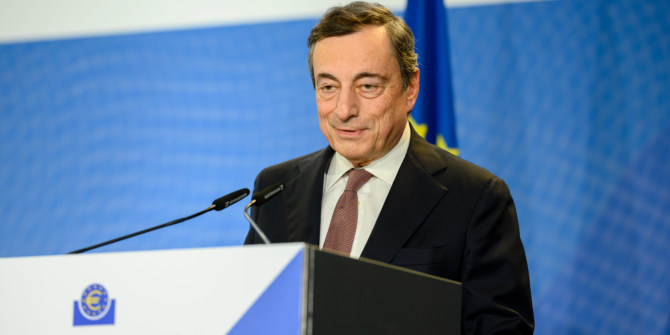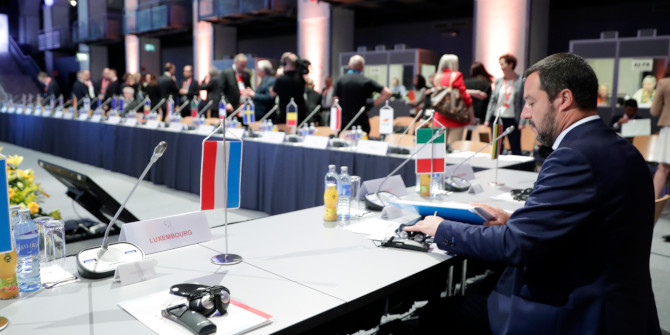 All eyes remain on Catalonia, with speculation that the Catalan government will soon issue a unilateral declaration of independence. Paul Kennedy writes that a further revision of Catalonia’s regional Statute, or even an amendment of the constitution, could be possible options for enabling both sides to come to a solution. But it remains to be seen whether the Spanish and Catalan governments are capable of improving on the largely inadequate response they have so far produced to the crisis.
All eyes remain on Catalonia, with speculation that the Catalan government will soon issue a unilateral declaration of independence. Paul Kennedy writes that a further revision of Catalonia’s regional Statute, or even an amendment of the constitution, could be possible options for enabling both sides to come to a solution. But it remains to be seen whether the Spanish and Catalan governments are capable of improving on the largely inadequate response they have so far produced to the crisis.

Credit: Generalitat de Catalunya (CC)
With the exception of the failed coup d’état of February 1981, recent developments in Catalonia constitute the greatest challenge to the established constitutional order since the return of democracy following Franco’s death. While it is important to stress at the outset that the ‘referendum’ held on Sunday 1 October had no legal or constitutional grounding – the 1978 constitution, like its European equivalents, contains no provisions on a region’s right to secede – the Rajoy government’s refusal to look beyond narrow legal interpretations has placed it on a collision course with the similarly inflexible Catalan government led by Carles Puigdemont. This has plunged Spain into crisis.
Since 2012, Catalonia’s Diada, or national day on 11 September, has been marked by demonstrations attended by hundreds of thousands of people peacefully demanding independence. The regional government, which has been under the control of the centre-right electoral alliance Convergence and Union (CiU) for most of the post-Franco period, played a key role in upping the ante as it sought to retain its electoral popularity by burnishing its pro-independence credentials within the context of a tough economic environment dominated by austerity.
The damage done to the CiU by serious corruption allegations affecting its founding father, Jordi Pujol, were a further factor in this shift. Unable to share its partner’s move towards advocating independence from Spain, CiU’s junior partner, the Democratic Union of Catalunya (UDC), broke away in June 2015, a development which indicated the scale of the disagreements within its leading representatives. At regional elections held three months later, the then regional president, Artur Mas, indicated that the election should be viewed essentially as an alternative vote on independence.
He entered the election in alliance with the similarly pro-independence, far-left Republican Left (ERC). Although the alliance in favour of independence narrowly failed to obtain over half of the vote at the election, it formed an overall majority with the support of the anti-capitalist Popular Unity Candidacy (CUP), who nevertheless insisted that Mas should step down as president. The radical stance subsequently adopted by his replacement, Carles Puigdemont, is an indication of the influence exerted by his partners, ERC and CUP. This development might be viewed as ‘the tail wagging the Cat(alan president).’ Puigdemont’s radical partners will not wish him to duck the challenge of a unilateral declaration of independence (UDI). If, over the coming period, Puigdemont is arrested by the Spanish authorities, he will undoubtedly be viewed by some as a martyr to the cause.
The indefensible use of violence by the Spanish police and Civil Guard on the day of the unofficial referendum was the factor which, more than any other, drew international attention towards events in the region. In this sense, Rajoy’s heavy-handedness played into Puigdemont’s hands; whether Rajoy calculated that such a response might be welcomed by his traditional support base in the rest of Spain remains a moot point. It is perhaps more likely that such actions have created greater backing for independence in Catalonia from those previously minded to oppose it. Well-attended demonstrations in Barcelona in favour of Catalonia remaining part of Spain on 8 October have by no means mitigated the damage already done. The King’s failure, in his televised address, to condemn the violent response of Spain’s security forces on the day of the referendum should similarly be viewed as an insensitive error.
If there is to be a satisfactory solution to the current crisis, it must be based on a response from both sides which addresses both legal and political aspects of Catalonia’s status within Spain. Although any unilateral declaration of independence is devoid of any legal basis, such a step would undoubtedly have political repercussions. A UDI, the use of police violence on people simply going out to vote, and the insistence on pre-conditions which hamper any serious attempt at negotiation must all be recognised as being factors which have brought Spain and Catalonia to the brink. Should Puigdemont, having marched his men to the top of the hill, press on with a UDI, Rajoy may well respond by activating Article 155 of the constitution – its first ever use – which constitutes nothing less than the ‘nuclear’ option.
This would mean Madrid taking over direct control of Catalonia and suspending Catalan regional institutions. If this happens, all hell may break loose, as there will quite likely be even greater violence. Catalans will have to decide which side they are on in this stand-off: Catalonia or Madrid. It is to be hoped that such a step can be avoided, possibly via a further revision of Catalonia’s regional Statute, or even an amendment of the constitution itself. The previous socialist government, with the support of the then opposition Popular Party, introduced an amendment in 2011 prioritising payment of the deficit; another, even more significant, amendment may now be necessary, however controversial such a step may be.
Such a solution would essentially mean enabling both sides to work together for the common good. It remains to be seen whether the political class in both Spain and Catalonia is capable of improving on its hitherto woeful response to the country’s worst crisis in four decades.
Please read our comments policy before commenting.
Note: This article gives the views of the author, not the position of EUROPP – European Politics and Policy or the London School of Economics.
_________________________________

Paul Kennedy – University of Bath
Dr Paul Kennedy is Lecturer in Spanish & European Studies at the University of Bath. He is the author of The Spanish Socialist Party and the modernisation of Spain (Manchester University Press: 2013) and co-editor, with Rob Manwaring, of Why the left loses: The Decline of the Centre-Left in Comparative Perspective (Policy Press: 2017). Together with co-author David Cutts, Paul is also writing a book on Podemos, entitled, Podemos and the Art of the Possible, for Manchester University Press, which is to be published in 2018.




